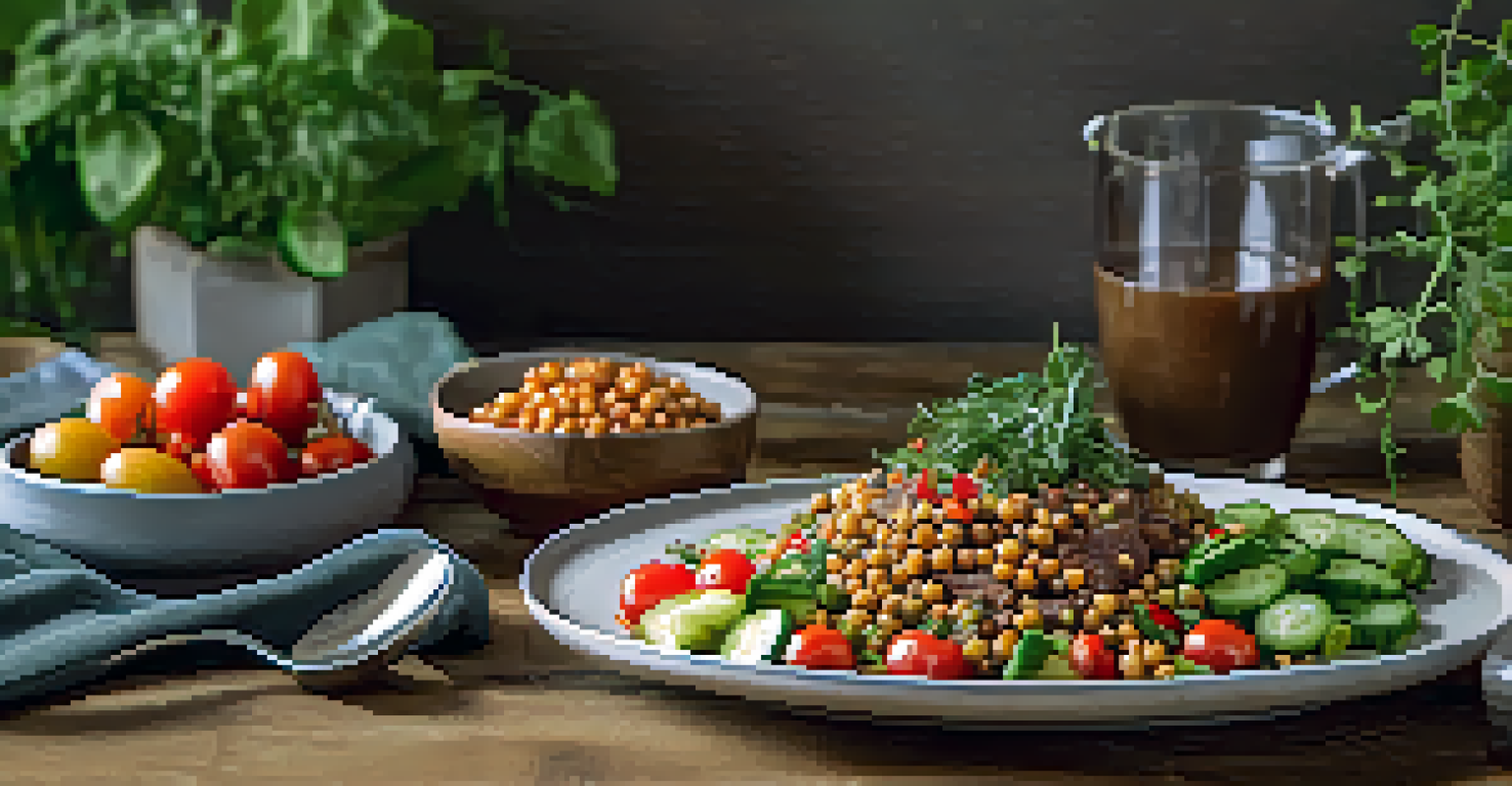How to Transition to a Vegetarian Diet: Tips and Tricks

Understanding the Benefits of a Vegetarian Diet
Transitioning to a vegetarian diet can offer a wealth of health benefits. Many people find that reducing meat intake can lead to lower cholesterol levels and improved heart health. Moreover, a plant-based diet is often rich in vitamins, minerals, and antioxidants, which can enhance overall well-being.
Eating plants is a way to connect with nature and the world around you.
Beyond personal health, adopting a vegetarian lifestyle contributes positively to the environment. The meat industry is a significant contributor to greenhouse gas emissions, so choosing plant-based options can help reduce your carbon footprint. Each meal can be a step towards a more sustainable future.
Additionally, many find that a vegetarian diet encourages creativity in the kitchen. With a diverse array of fruits, vegetables, grains, and legumes to explore, you might discover new favorite dishes that are not only healthy but also delicious.
Start Gradually: Small Changes Make Big Differences
When making the switch to a vegetarian diet, it's often best to start small. Begin by incorporating one or two meatless meals into your week, gradually increasing the frequency as you become more comfortable. This approach allows your taste buds and digestive system to adjust without overwhelming you.

For example, consider trying Meatless Mondays to kick off your journey. This not only makes the transition manageable but also helps you explore a variety of vegetarian recipes that you may fall in love with. You might be surprised at how satisfying a hearty lentil stew or a colorful vegetable stir-fry can be.
Health Benefits of Vegetarianism
Transitioning to a vegetarian diet can lead to improved heart health and enhanced overall well-being.
As you gain confidence, you can explore other plant-based options and experiment with different cuisines. This gradual approach can be both enjoyable and rewarding, turning the transition into a culinary adventure rather than a daunting task.
Explore Plant-Based Protein Sources
One common concern when switching to a vegetarian diet is getting enough protein. Fortunately, there are plenty of delicious plant-based protein sources to choose from. Foods like beans, lentils, quinoa, tofu, and nuts are not only rich in protein but also packed with other essential nutrients.
The food you eat can be either the safest and most powerful form of medicine or the slowest form of poison.
For instance, chickpeas can be transformed into creamy hummus or roasted for a crunchy snack. Quinoa is a versatile grain that can be used in salads, bowls, or even as a breakfast porridge. By diversifying your protein sources, you can ensure you're meeting your nutritional needs while enjoying a wide range of flavors.
Don’t forget to combine different protein sources for a complete amino acid profile. For example, pairing rice with beans creates a complete protein, making your meals both nutritious and satisfying.
Plan Your Meals to Avoid Nutritional Gaps
Planning meals is crucial when transitioning to a vegetarian diet. By organizing your meals ahead of time, you can ensure that you're getting a balanced intake of essential nutrients. This way, you're less likely to reach for less nutritious options when hunger strikes.
Consider creating a weekly meal plan that incorporates a variety of fruits, vegetables, whole grains, and proteins. Utilizing planning apps or traditional planners can help you visualize your meals and make grocery shopping easier. Don't forget to include snacks that are both satisfying and nutritious, like trail mix or fresh fruit.
Plan Meals for Balanced Nutrition
Meal planning is essential to ensure a balanced intake of nutrients and avoid nutritional gaps.
Also, be mindful of nutrients that are commonly lower in vegetarian diets, such as vitamin B12, iron, and omega-3 fatty acids. If needed, consider fortified foods or supplements to fill any gaps and consult with a nutritionist for personalized advice.
Experiment with New Recipes and Ingredients
One of the joys of transitioning to a vegetarian diet is the opportunity to experiment with new recipes and ingredients. With countless cookbooks, blogs, and cooking shows dedicated to vegetarian cuisine, inspiration is just a click away. Trying out new dishes can keep your meals exciting and flavorful.
Consider exploring international cuisines that naturally feature vegetarian dishes, such as Indian, Mediterranean, or Thai. Dishes like vegetable curry, falafel, or pad Thai can introduce you to new flavors and cooking techniques that you might not have tried before.
Don't hesitate to get creative in the kitchen! You can modify traditional recipes by swapping out meat for hearty vegetables or plant-based proteins. This not only makes meals healthier but can also lead to delightful culinary surprises.
Build a Support Network for Your Journey
Transitioning to a vegetarian diet can be a significant lifestyle change, and having a support network can make the journey easier. Connecting with friends, family, or online communities who share your goals can provide encouragement and motivation. You might even discover new meal ideas or recipes from those who have successfully made the switch.
Joining local vegetarian or vegan groups can also offer a sense of community. Many cities have meetups, potlucks, or cooking classes focused on plant-based cooking, giving you a chance to learn and share experiences with like-minded individuals.
Build a Supportive Community
Connecting with others who share your dietary goals can provide motivation and enhance your vegetarian journey.
Remember, it’s okay to lean on others for support. Whether it’s seeking advice on meal planning or sharing your successes, having a community can enhance your experience and keep you inspired throughout your transition.
Listen to Your Body and Adjust as Needed
As you transition to a vegetarian diet, it's essential to listen to your body and be mindful of how you feel. Everyone's nutritional needs are different, and what works for one person may not work for another. Pay attention to your energy levels, digestion, and overall health as you make changes.
If you notice any discomfort or changes in your well-being, consider tweaking your diet. This could mean adjusting portion sizes, exploring new food combinations, or even consulting with a healthcare professional for personalized guidance. Listening to your body is key to finding balance in your new eating habits.

Additionally, don't be too hard on yourself during this process. It's normal to have ups and downs as you adjust. Celebrate your progress, no matter how small, and remember that every meal is an opportunity to learn and grow in your vegetarian journey.